When you buy a product through our links below, we may earn money from our affiliate partners to help support the site. However, this does not affect our evaluation or recommendation of each product. See our list of partners & how we get paid here. You can also learn our process for reviewing tennis gear here.
In this review guide of the best tennis strings, we will show you the 10 best strings on the market, and how to choose the perfect string for your game.
Our expert team has decades of experience playing tennis and stringing racquets professionally. We play-tested, analyzed, and reviewed each string on our list based on several factors, including Price, Durability, Comfort, Control, Feel, and Power.
Our goal is to teach you everything you need to know about tennis strings and help you find the string best suited for you. Whether you’re a highly competitive, advanced tennis player, or a beginner just starting out, we’ve reviewed a tennis string for you below.
Best Tennis Strings by Category & Skill-Level
We reviewed each string in detail below. However, the table below summarizes the 10 best strings by skill level and type.
| Tennis String | String Type & Skill Level | Summary & Review |
|---|---|---|
| Solinco Hyper-G Heaven | Polyester – High Intermediate to Advanced | Spin, power, & durability Jump to Review |
| Luxilon 4G Soft | Polyester – Advanced | Control & durability Jump to Review |
| Yonex PolyTour Air | Polyester – Intermediate to Advanced | Power & feel for a polyester Jump to Review |
| Tecnifibre X-One Biphase | Multifilament – All Skill Levels | Power & comfort Jump to Review |
| Head Velocity MLT | Multifilament – All Skill Levels | Comfort & control Jump to Review |
| Prince Synthetic Gut Duraflex | Synthetic Gut – All Skill Levels | Budget-friendly Jump to Review |
| Babolat Touch VS | Natural Gut – All Skill Levels | Premium power & comfort Jump to Review |
| Gamma Ocho TNT | Synthetic Gut – Intermediate | Spin & comfort Jump to Review |
| Tecnifibre HDMX | Multifilament-Poly Fusion – Intermediate to Advanced | Durability & comfort Jump to Review |
| Wilson Champion’s Choice Duo | Polyester & Natural Gut Hybrid – Intermediate to Advanced | Great combination of control, spin, & durability Jump to Review |
Stop paying full price for tennis gear! Get deals on shoes, racquets & more up to 70% off.
Reviews of the 10 Best Tennis Strings
Below, we will review the top 10 tennis strings and include specific features of each string, such as:
- Shape | How is the string designed?
- Type | What type of string is it?
- Price | Scale from 1-3 dollar signs.
- Gauge | How thick is the string?
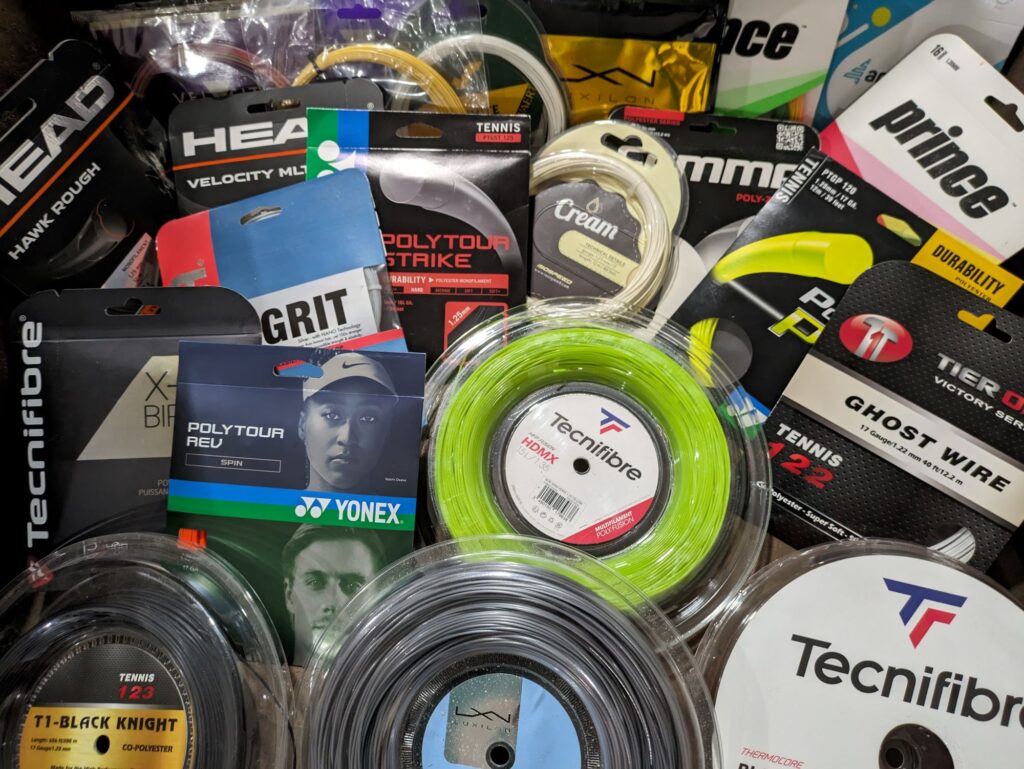
#1 – Solinco Hyper-G Heaven
With its edged shape, Solinco’s Hyper-G provides remarkable spin and control for a polyester string. Strong in almost all areas of playability, it excels, especially in its durability and control.
While other poly strings can be stiff and lose tension quickly, Hyper-G exhibits extraordinary feel and maintains tension after playing. Finally, this is a great alternative for advanced players who are looking for a polyester string that is easy on the arm due to the thinner gauges available.
As a competitive player who struggled with tennis elbow while playing with other polyester strings, Hyper-G helped me recover without sacrificing any quality.
Shape | Square
Type | Polyester
Price | $
Gauge | 16, 16L, 17, 18, 19, 20
Pros
- For a poly string, it offers great feel, control, and is rather durable
- Easy on the arm
- Four-edged string design provides spin
Cons
- Lacks power, and probably not suited for beginners
- While better than most polys, the string tension still drops quickly
#2 – Luxilon 4G Soft
Round and factory pre-stretched, Luxilon 4G Soft is one of the best control strings. Polyester strings generally don’t have very good tension maintenance, but 4G Soft is pre-stretched in the factory to minimize the tension loss once it is installed in the racquet.
This ‘Soft’ variant is also slightly more arm-friendly than the standard 4G, though those who suffer from tennis elbow will still want to look elsewhere. 4G Soft will not provide much power, but it will give you pinpoint precision on court.
Shape | Round
Type | Polyester
Price | $$$
Gauge | 16
Pros
- Unmatched control
- Best tension maintenance among polyester strings
- Extremely durable
Cons
- Harsh feel not suited to those with arm injuries
- As a polyester, lacks power
- Not ideal for beginners or intermediates
#3 – Yonex PolyTour Air
Traditional polyester strings are extremely stiff and not suitable for most players. Yonex PolyTour Air is a newer polyester that is softer and more powerful, helping more players explore the world of polyester strings. Players who have a more sensitive arm but still want the spin potential of a polyester string should give this a try.
While this string does suffer from sub-par tension maintenance like most polyester strings, it does excel by providing above-average power and good spin potential.
Shape | Round
Type | Polyester
Price | $$
Gauge | 16L
Pros
- Great power and comfort for a polyester
- Great for intermediate and advanced players
Cons
- Sub-par tension maintenance
- Too stiff for most beginners
#4 – Tecnifibre X-One Biphase
Tecnifibre makes some of the best multifilament strings on the market, and X-One Biphase is our favorite. It is one of the softest strings on the market and provides plenty of power.
While durability can be an issue, this string comes in several gauges to let you choose which works best for you. Any player who has suffered arm injuries should seriously consider testing out Tecnifibre X-One Biphase.
Shape | Round
Type | Multifilament
Price | $$
Gauge | 15L, 16, 17, 18
Pros
- Helps players avoid issues such as tennis elbow
- Great comfort and notable power
- Several gauges to choose from
Cons
- Not durable enough for string breakers
#5 – Head Velocity MLT
Head is not only one of the best tennis racquet brands, but also makes some of the best tennis strings. Head Velocity MLT is one of the more affordable multifilament strings. Like most multifilaments, it has exceptional comfort, but it also has a surprising amount of control.
While still not the most durable, Head Velocity is a great option for those with sensitive arms who want a string that is less powerful or more budget-friendly.
Shape | Round
Type | Multifilament
Price | $
Gauge | 16, 17
Pros
- Very affordable
- Decent feel & control
- Great for newer players
- Several color options
Cons
- Not great for advanced players
- Not very durable
#6 – Prince Synthetic Gut Duraflex
Prince Synthetic Gut Duraflex is a great all-around string. It is a classic synthetic gut string with all-around performance providing a good balance of spin, durability, power, and comfort, all at a very budget-friendly price.
This is the perfect string for beginners and intermediates who want an inexpensive string that they won’t have to restring often.
Shape | Round
Type | Synthetic Gut
Price | $
Gauge | 15L, 16, 17
Pros
- All-around performance
- Arm-friendly
- Inexpensive compared to other top brands
Cons
- Doesn’t excel in any particular area
- Not great for advanced players
#7 – Babolat Touch VS
Babolat Touch VS is the sports car of the tennis world; very powerful and fun to use, but expensive and not for everyone. While it comes at a premium, for many it is well worth the cost. It is one of the most powerful and soft strings available, making it perfect for those prone to, or recovering from, injury.
Babolat Touch VS also has a special coating on the strings to increase spin potential and durability. If money is not an issue, this string is definitely worth a try.
Shape | Round
Type | Natural Gut
Price | $$$
Gauge | 15L, 16, 17
Pros
- Special coating increases longevity
- Amazing feel, power, and tension maintenance
- Most arm-friendly string available
Cons
- Expensive for non-competitive players
#8 – Gamma Ocho TNT
Gamma Ocho TNT takes the power and comfort from its TNT strings and adds 8 sides to achieve unrivaled spin for a synthetic gut. Intermediate players looking to add a little spin and aren’t quite ready to make the jump to polyester strings should look no further than Gamma Ocho TNT. It works particularly well for spin-loving players who also want an arm-friendly string.
Shape | Octagonal
Type | Synthetic Gut
Price | $$
Gauge | 17
Pros
- Great power and comfort
- Unmatched spin for a synthetic gut
Cons
- Not the most durable
#9 – Tecnifibre HDMX
Tecnifibre HDMX is a very unique offering, combining the construction of a multifilament string with strands of polyester woven in creating what they call poly-fusion. This creates one of the most durable non-polyester strings on the market while still being more arm-friendly than normal polyester strings. It also provides above-average spin and control.
Shape | Round
Type | Multifilament-Poly Fusion
Price | $$$
Gauge | 15L, 16, 17
Pros
- Very durable
- More arm-friendly than normal polyester strings
Cons
- Expensive
- Lower spin potential than normal polyester strings
#10 – Wilson Champion’s Choice Duo
Wilson makes some of the best tennis balls and racquets on the market, but they also make some great strings.
Marketed as the string of Roger Federer, the Wilson Champion’s Choice Duo is a perfect balance between natural gut and the rougher polyester. By combining these two fundamental types, this string ranks well among all aspects of performance, including comfort, durability, power, control, and touch.
It comes as a hybrid, so you can choose if you want the more powerful natural gut in the mains or the more control-oriented and durable polyester strings in the mains. This makes it a great option for intermediate and advanced players who don’t mind investing in a premium string with all-around performance.
Shape | Rough texture (polyester) and round (natural gut)
Type | Polyester and Natural Gut
Price | $$$
Gauge | 16
Pros
- Hybrid pack gives you two setup options
- Mixture of gut and poly provides all-around excellence
- Championed by Roger Federer himself
Cons
- Expensive
Stop paying full price for tennis gear! Get deals on shoes, racquets & more up to 70% off.
Buyer’s Guide: How to Choose the Best Tennis String
Before you choose a tennis string to play with, you should ask yourself a few questions.
Do I Want More Power or Control? Comfort or Durability?
When choosing a string, there are several different aspects to consider:
- Power
- Control
- Comfort
- Feel
- Durability
- Shape
You have to decide which characteristics are most important for you. In general, strings that are powerful also have high levels of comfort and feel, but suffer when it comes to control and durability.
Shaped strings generally have lower durability than round strings, but shape doesn’t have much of an effect on power, control, or comfort.
What is My Skill Level?
Beginners generally don’t want to invest too much money into their strings just yet and have slower swings, so they’ll often look for cheaper strings that give a little power.
- Our top rated beginner tennis string is Prince Synthetic Gut with Duraflex
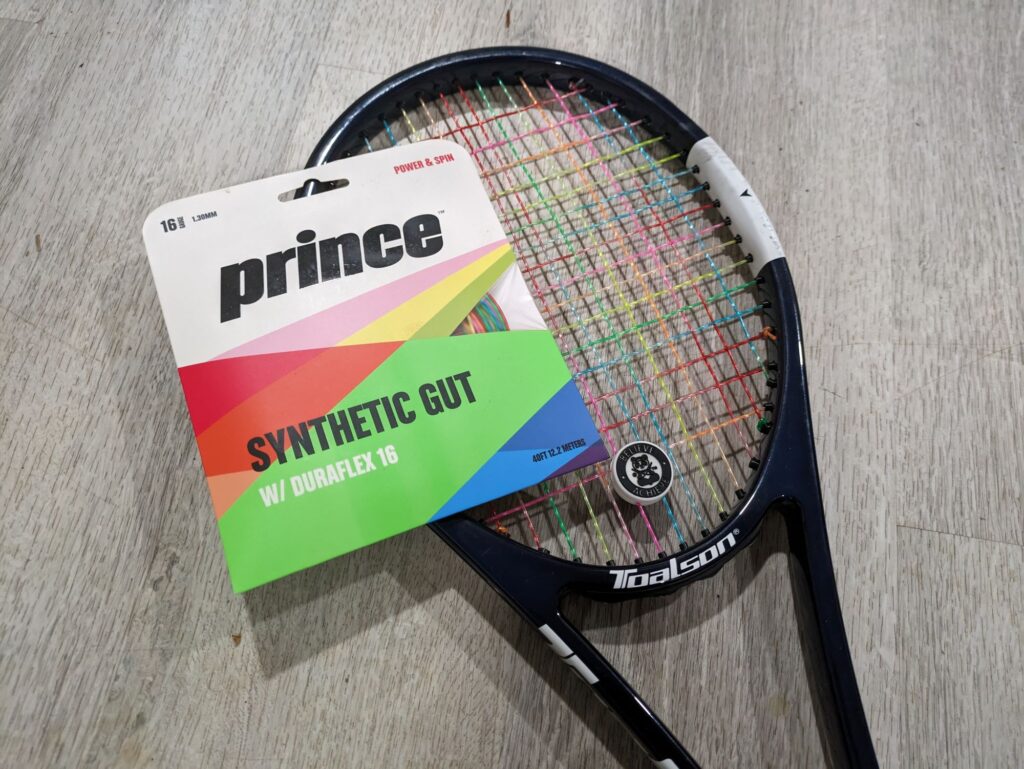
Intermediates often are beginning to find their style of play and are swinging more confidently. They may benefit from a little better feel and comfort to help avoid injuries while they refine their technique. Higher intermediates may also begin to search for durability or control.
- Our pick for best non-polyester intermediate string is Gamma Ocho TNT
- The best polyester string for an intermediate is Yonex PolyTour Air
Many advanced players will begin breaking strings more frequently and focus on durability, control, and even shape to enhance spin potential.
- The best string for an advanced player is Solinco Hyper-G
What Type of Tennis String Should I Use?
You might have heard people use terms like poly, multifilament, synthetic gut, natural gut, and hybrid. What does this all mean? Below is a brief description of the characteristics of the most common tennis string types.
- Natural gut: Best for power and recovering from injury
- Multifilament: best for power without breaking the bank
- Synthetic gut: best for beginners & intermediate players
- Polyester: best for advanced players who break strings often
- Hybrid: a combination of 2 different strings, one in the mains and one in the crosses
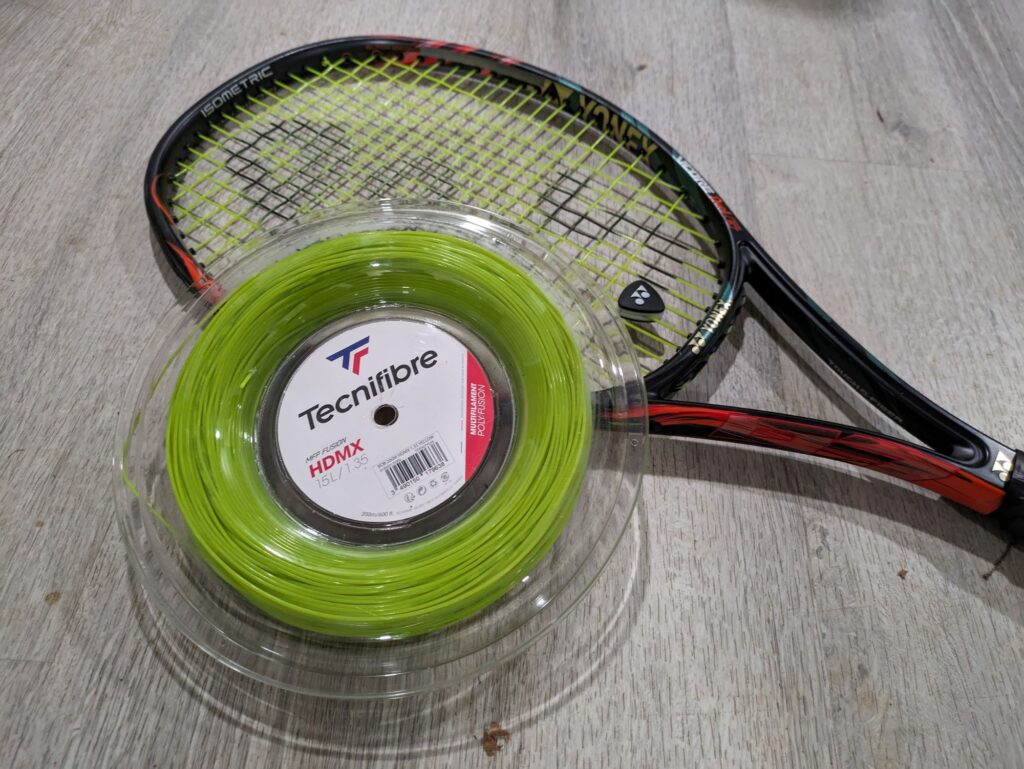
What is My Budget?
Tennis strings come in a wide range of prices. You can get a set of string for under $5 or you can spend over $50, and that’s not even counting the cost of labor to get your racquet strung (typically $15 to $25 per racquet).
You also need to consider durability when looking at cost. For example, a $10 set of string that breaks after one week may end up being more expensive than a $20 set of string that lasts you a month.
- The best string under $10 is Prince Synthetic Gut with Duraflex
- The best string in the $10-$20 range is Head Velocity MLT
- The best string over $20 is Wilson Champion’s Choice Due
Do I Have Tennis Elbow or tendonitis, or am I at Greater Risk of Injury?
There are several ways to decrease your risk of injury or help you recover from an injury. In general, you will benefit from a softer string setup. The softest strings available are natural gut strings, but they’re also expensive. You might also consider a multifilament string. We’ve also reviewed the best tennis elbow braces which can help alleviate pain from tendonitis.
- The best high-end string for tennis elbow is Babolat Touch VS
- The best string for injury at a mid-tier price is Tecnifibre X-One Biphase
How Often Should I Restring My Racquet?
You can benefit by restringing your racquet before the strings break as well. Playing with old, dead strings can contribute to injuries. A good rule of thumb is to restring at least as many times per year as you play per week. For example, if you play three times per week, you should be stringing at minimum three times per year, or every 4 months.
Note: polyester strings should be avoided if you have tennis elbow, but should be restrung more frequently than other types of strings.
Be sure to consult with your doctor to treat any serious injuries.
Conclusion: Our Pick for the Best Tennis String
With all the different characteristics of strings and the different needs of players, it’s impossible to narrow down the single best tennis string for everyone. You need to determine what characteristics are most important to you, your skill level, what type of string you want, what your budget is, and if you have any injuries.
After taking all that into account, take another look at our list above of the best tennis strings on the market.
Once you have found the perfect string, you have already begun to customize your racquet. If you want to personalize your setup even more, check out how to customize a tennis racquet.
What do you think of our list? Are there any strings you think we missed? Let us know in the comments below!

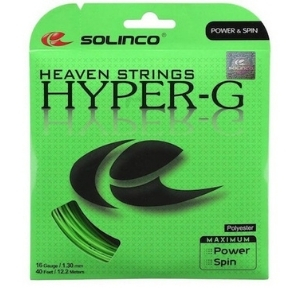
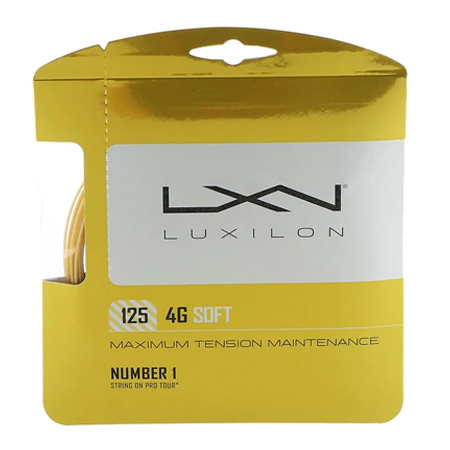
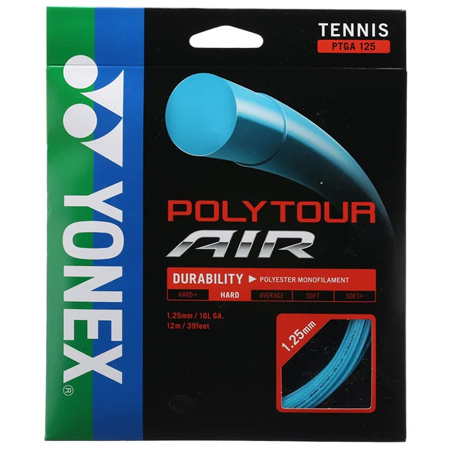
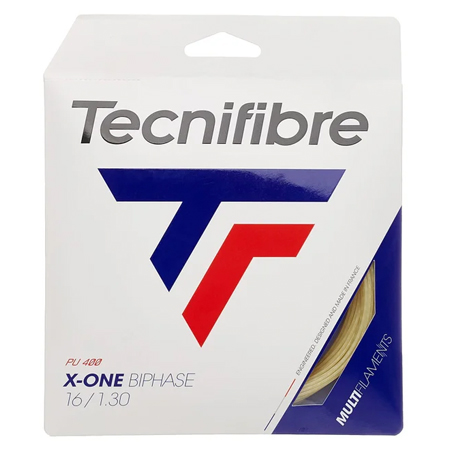
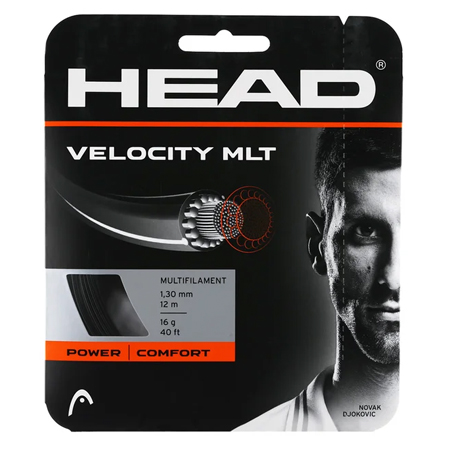
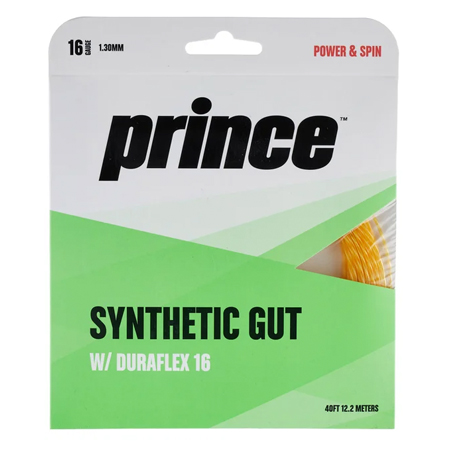
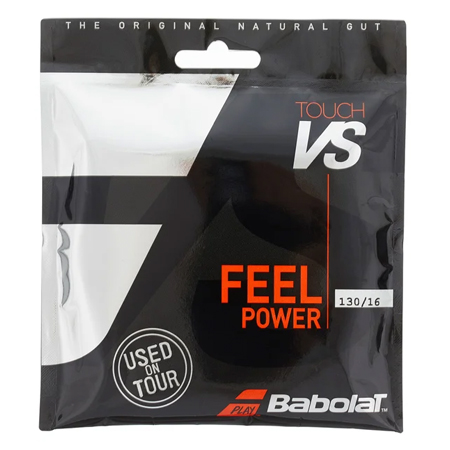
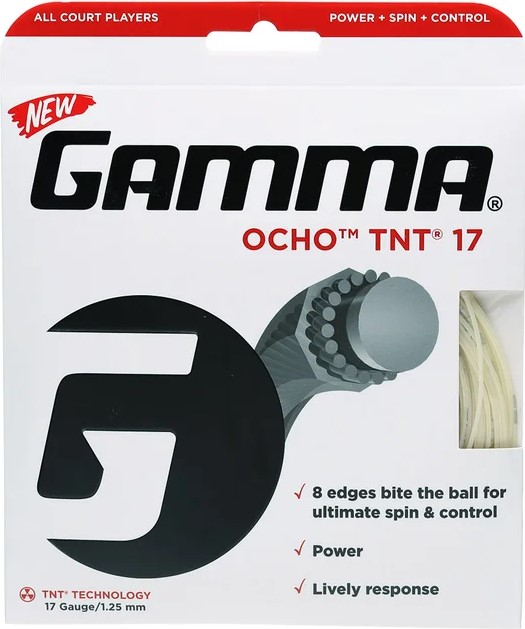
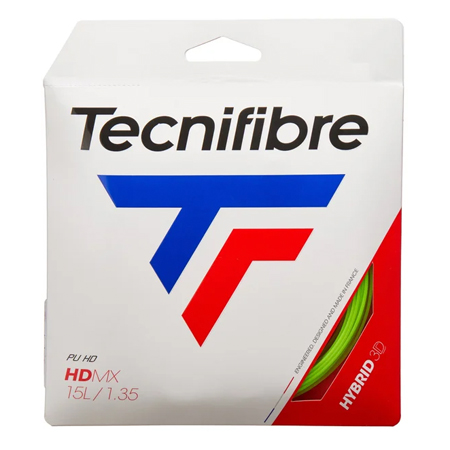
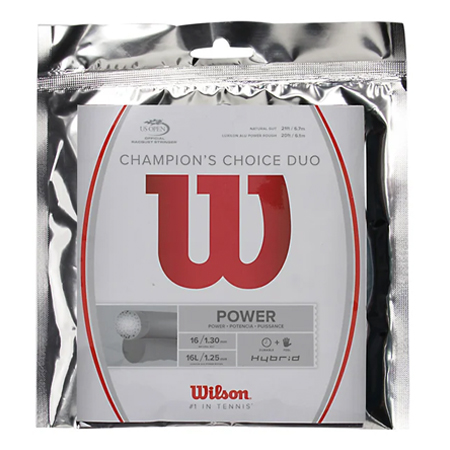
Leave a Reply